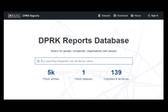DPRK Reports Database
DPRK Reports is an initiative providing open access to high-quality, structured data from the United Nations North Korea Panel of Experts’ reports in an accessible format.
RUSI’s extensive programme on sanctions implementation outreach and technical assistance has shown that the effective implementation of international sanctions requires equal participation by states, their institutions and their industries, but that smaller institutions – especially those in the developing world – tend to lack access to information, tools and other resources that would promote more effective implementation.
While the UN Panel of Experts’ reports provide a wealth of information, it is often in inaccessible and unstructured formats. The DPRK Reports project tackles this issue head on. In collaboration with NK News, RUSI has assembled a dataset of more than 5,000 entities and their relationships that are described throughout the UN DPRK Panel of Experts’ reports from 2010 to 2023.
The database is fully searchable as well as downloadable, in its entirety, as a JSON-formatted or CSV file. The fields are structured with ISO standards, using the 'Follow-the-Money' structure/typology, for ease of incorporation into existing databases.
Project team
Dr Aaron Arnold
RUSI Senior Associate Fellow, CFS
Centre for Finance and Security
Dr Giangiuseppe Pili
RUSI Associate Fellow, Proliferation and Nuclear Policy
Chad O’Carroll, Founder and CEO, NK News
Nils Weisensee, Director of News Operations, NK News
View database
Aims and objectives
The DPRK Reports Database project aims to address sanctions implementation gaps by providing access to high-quality, structured data from the UN Panel of Experts reports on North Korea. Structuring data from the reports, which is often in inaccessible formats, will help the public and private sector to illuminate previously unidentified connections, provide an accurate and complete repository of case information, and can be used to identify emerging trends and assist with sanctions implementation efforts (eg, due diligence and compliance) more effectively. Importantly, the project is designed to be accessible, provided in both human-readable and machine-readable formats.



